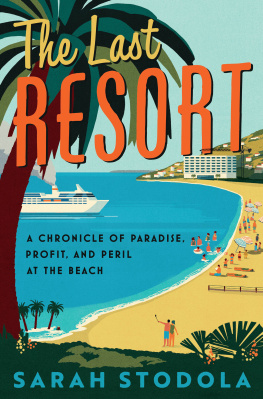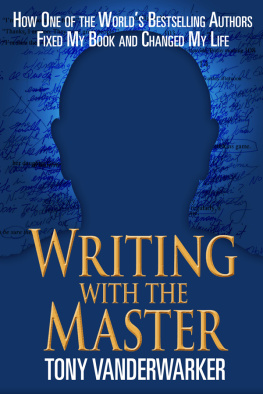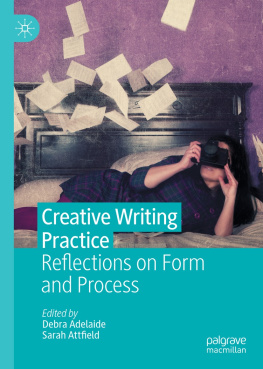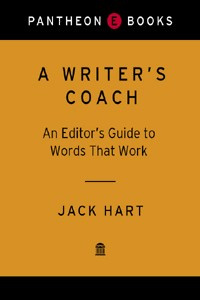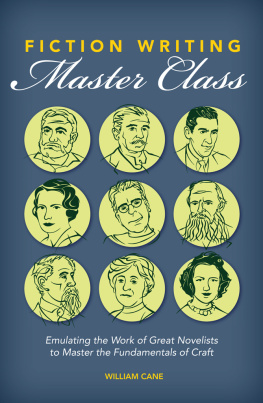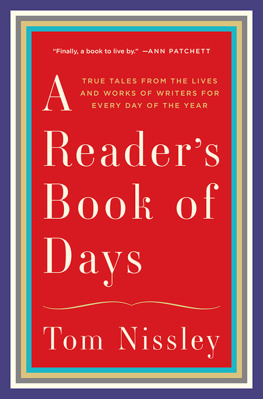

Text copyright 2015 Sarah Stodola
All rights reserved.
No part of this book may be reproduced, or stored in a retrieval system, or transmitted in any form or by any means, electronic, mechanical, photocopying, recording, or otherwise, without express written permission of the publisher.
Published by Amazon Publishing, New York
www.apub.com
Amazon, the Amazon logo, and Amazon Publishing are trademarks of Amazon.com, Inc., or its affiliates.
ISBN-13: 9781477801086
ISBN-10: 1477801081
Cover design by Rodrigo Corral Design
Library of Congress Control Number: 2014913443
For Ed and Sue and for Scott
CONTENTS
FOREWORD
For the past few years, I have written a weekly interview column in which I discuss the writing lifetips, quirks, and tricks of the tradewith fellow authors. I have conducted more than eighty of these interviews, many with heroes of mine. My interviews are riffs on a set questionnaire I have prepared, inspired by a popular nineteenth-century parlor game called the Confession Book. In this game, a host would pass around a book that was blank, aside from the same set of questions printed on every page. Each guest would fill in his or her answers, and the responses would prompt lively dinner party discussions. The most famous variation on the Confession Book was penned by Marcel Proust (supposedly when he was only fourteen years old) and was adapted by a variety of sources, from Vanity Fair to Inside the Actors Studio. My version of the Confession Book is all about writing and the lives of writers. The idea of asking the same questions of many people allows for horizontal and vertical comparisons: What did Virginia Woolf, Margaret Atwood, and Edith Wharton eat for breakfast? How many authors wrote freehand? Over the years, dozens of writers, editors, publishers, publicists, and aspiring authors have written to tell me how helpful they find interviews with writers about writing. Read enough of them, and you start to spot trends that can be helpful to your own work. For instance, dozens of authors feel that a successful writing day will produce one thousand words, and many recommend mapping out ones plot on index cards.
Sarah Stodola has managed to do something I never thought possible: to interview famous writers who are long dead. Alongside renowned living authors, such as Junot Daz, Joan Didion, and Margaret Atwood, we have James Joyce, Vladimir Nabokov, and Jack Kerouac. She has sifted through reams of text to pull out the writing processes of an all-star cast of authors whose habits, methods, and oddities not only tell us much about them personally, but also offer sheaves of wisdom for modern writers to harvest.
Inventing interesting things to write about, and new ways to convey them, is exhausting. It is also rewarding, which is why we do it and why so many people from other walks of life dream of writing a book of their own.
Readers tend to overlook the intricacies involved in bringing a work to completion, and they see writers as a cult of pseudo-magicians, capable of conjuring worlds out of thought, spinning characters from thin air, and surely having a great time while doing so. In truth, a career as a writer is enjoyable, but also lonely. Tell that to a construction worker, a nurse, a truck driver, and you will likely be mocked. But conceiving of interesting ideas and conveying them in words is intellectually, if not physically, arduous. There are few Graham Greenes out there who polish off a few dozen lines in a few hours, then spend the majority of their day polishing off gin and tonics at Jamaican resorts. The writing life can be a slog, with twelve-hour days in self-imposed isolation, endless rewrites, hundreds of pages discarded by ornery editors, and a lifes work dismissed at the stroke of an overly clever critics pen. Writers tend to live within their own minds, rarely working with others, socializing with their comrades largely to gripe about the publishing industry, not to collaborate in the midst of a project.
It is refreshing, then, to learn that so many great writers share certain characteristics with their less-renowned colleagues (myself included), that the experience of being a professional writer has remained largely similar, whether in nineteenth-century Ireland, twentieth-century New York, or, in my case, twenty-first-century Slovenia. Habits, often bizarre, tend to propel writers forward, and it is reassuringly rare to find a writer who seems or self-describes as normal. Some have proverbial magic hats that they must wear while writing, from Virginia Woolfs preference for purple pens to Junot Dazs odd choice of listening to movie sound tracks while typing away (including that of Conan the Barbarian). Learning these wonderful details turns famous names into three-dimensional characterssome Dickensian caricaturesthe sort that one might say sound like pure fiction. We tend to deify authors, thinking of them as disembodied names who produce the works we crave and admire, failing to realize the long hours, aching fingers, and racked brains that these very human, warts-and-all people suffer in order to complete the books that we take for granted (often grumbling about having to pay ten dollars for them, if we pay for them at all).
Process combines author biography with lively details about writing habits, a sort of group biography through the lens of professional technique. This presents readers (many of whom will be aspiring writers) with a combination of demystification and mystification. The methods of famous writers are revealed (demystified), but the cultish details of how those writers work, in order to produce the masterpieces we so admire, demonstrate both the huge effort required and the bizarre, pseudo-mystical behavior that functions like oil in the cogs of their minds: Some authors must write in sealed rooms fitted with blackout blinds, while drinking massive quantities of iced tea prepared in a restaurant-grade brewer (Im looking at you, Michael Connelly). Without these exotic conditions, one writer just cannot produce, whereas another (that would be Arthur Phillips) works best in a busy caf, with a steady flow of pastries and beverages and the hum of the crowd flitting around him, while his beagles lounge at his feet. Fewer authors have an entirely flexible regimen, bereft of neurosis, than wear magic hats, listen exclusively to movie sound tracks, or write only on yellow legal pads between one and five in the morning.
This book will appeal both to writers and to lovers of literature. Just like watching cooking shows is as much a pleasure for enthusiastic eaters as it is for amateur cooks, so this book is written in such a way that one can glean lessons to apply to ones own writing process, or simply paint a deeper picture of the authors one admires, regardless of whether one also wishes to write. The biographical aspect of this book deals less with personal relationships and more with professional involvement, the idiosyncrasies that keep writers sane when their days are spent lost in imaginary palaces, planets, and personalities. This is all presented in lovely, easy-reading prose that demonstrates fine writing just as it writes about fine writers.
Writers who look to this book as a manual for how they might make their own work approach that of their literary heroes will find that, and there are consistencies, the writing process is largely unique, individual, and can sound very weird indeed. Some use the Internet actively, others turn to e-mail as a refreshing break before the hard work, and some cannot function if the temptation of e-mail and the Internet is within reach and lock themselves away from the media overload that is twenty-first-century life. Some writers blaze through first drafts and then edit, whereas others polish every phrase as they go, lucky to craft a few paragraphs on any given day. Readers of
Next page

